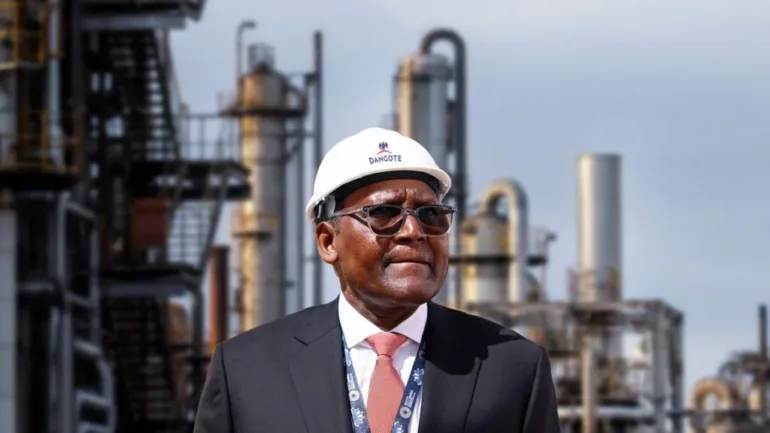The Dangote Petroleum Refinery has more than enough Premium Motor Spirit (PMS), also known as petrol, in storage to meet Nigeria’s local needs, according to Aliko Dangote, President of Dangote Industries Limited.
Speaking over the weekend, Dangote revealed that the refinery currently holds over half a billion litres of petroleum and more than 600 billion Naira worth of products in its tanks. He further confirmed that the refinery is producing sufficient refined products, including gasoline, diesel, and kerosene, to meet 100 percent of Nigeria’s domestic requirements.
“Right now, we have more than half a billion litres in storage. The refinery is producing enough refined products—gasoline, diesel, and kerosene—to meet all of Nigeria’s needs,” Dangote stated.
The remarks came after a tour of the refinery complex by a Zambian government delegation led by the country’s Minister of Energy, Mr. Makozo Chikote. Dangote emphasized that the refinery, like other projects by Dangote Industries, is not solely for Nigeria, but is intended for the entire African continent.
“This refinery is not just for Nigeria; it’s for Africa. We are committed to supporting the African Continental Free Trade Area (AfCFTA) and exploring trade opportunities with other African nations,” he said.
Minister Chikote expressed his admiration for Dangote’s vision, stating that his takeaway from the visit was that Dangote is focused on the bigger picture for Africa. He led a delegation of energy experts to the Dangote Petroleum Refinery to explore potential partnerships with Zambia in energy solutions.
Following the tour of Dangote’s complex at the Free Trade Zone in Ibeju Lekki, which included the Single Point Mooring, the Dangote Jetty, Africa’s largest fertilizer plant, and the world’s largest single-train refinery with a capacity of 650,000 barrels per day, Chikote praised the presentation by Mr. Edwin Devakumar, Vice President of Oil and Gas at Dangote Industries Limited. He noted that the insights provided addressed challenges facing Zambia.
“In Zambia, we have created an environment that encourages private sector participation in the country’s growth. Currently, 100 percent of our petroleum is handled by the private sector,” Chikote remarked. “We are focused on increasing productivity in sectors like mining and agriculture, and the solutions presented here could immediately address our energy needs. We look forward to working with Dangote, as this partnership will lead to more efficient, reliable, and competitive products.”
Chikote further stressed the importance of promoting trade within Africa to make the continent a more efficient and reliable trading hub. He added that Zambia could learn from Dangote’s initiatives to reduce dependence on external support and strengthen Africa’s economic independence.
Samuel Maimbo, a member of the Zambian delegation and Vice President of Budget, Performance Review, and Strategic Planning at the World Bank Group, echoed similar sentiments. Maimbo, who is campaigning for the presidency of the African Development Bank (AfDB), emphasized that Africa’s growth cannot rely on development aid alone. He called for increased private sector involvement in financing Africa’s development.
“There is not enough development aid or government funding to solve Africa’s problems. The only way we can achieve sustainable growth is by working with the private sector, which is why we are here today—to see how ambitious programs like this can help,” Maimbo said.
Edwin Devakumar, Vice President of Dangote Industries, reiterated that the refinery is focused on producing the highest quality products as part of its core business strategy. He explained that the refinery was designed to process Nigerian crude, while also allowing for flexibility to process other African and Middle Eastern crudes.
“We designed the refinery to maximize value extraction, ensuring that every barrel of crude processed adds the highest possible value,” said Devakumar.
He also highlighted that the refinery is well-equipped to meet local and international demands. “The refinery can meet 44 percent of Nigeria’s total requirements, while 56 percent of our production is earmarked for export. Every day, we produce 104 million litres of lighter products, including 57 million litres of petrol, 20 million litres of jet fuel, and 27 million litres of diesel. Nigeria’s local consumption is only around 46 million litres, so the remaining 58 million litres will be exported daily,” Devakumar concluded.


